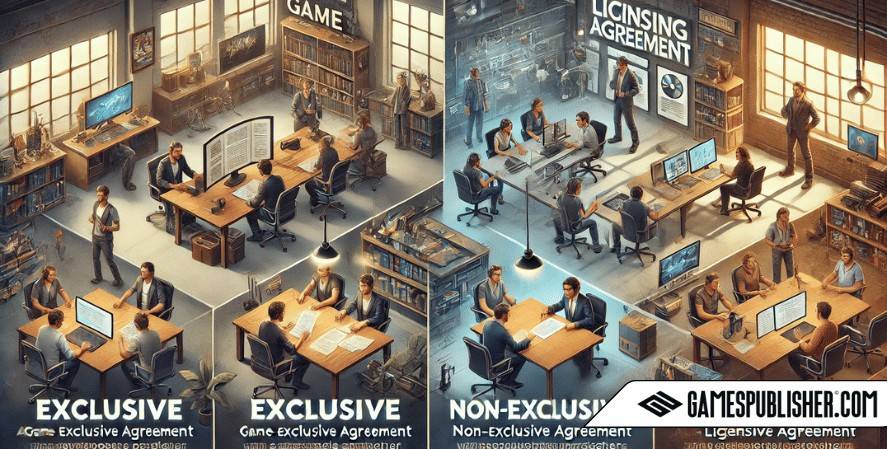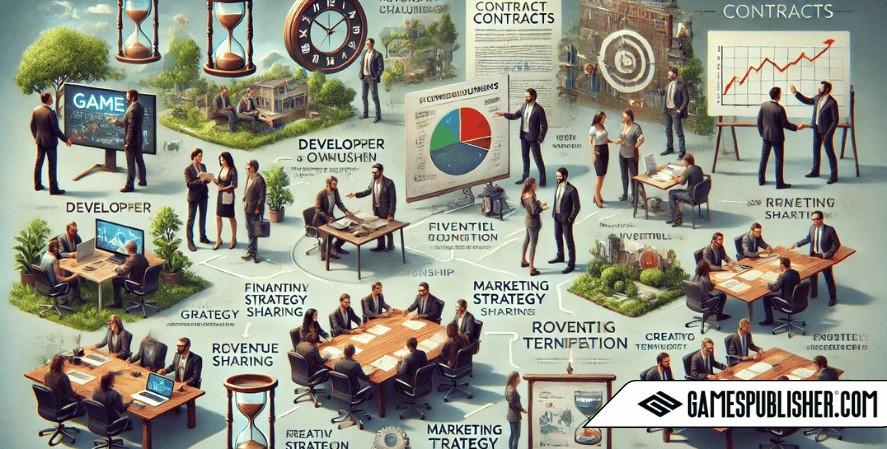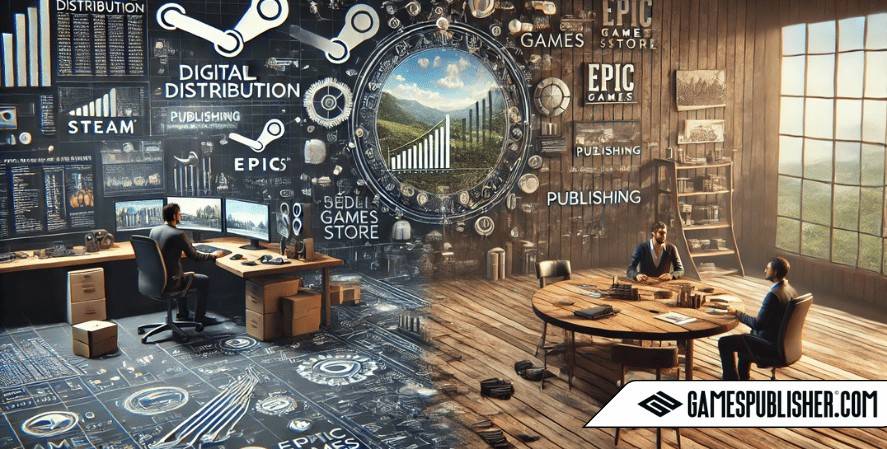Welcome to Gamespublisher.com, your go-to source for game developers and publishers! If you’re a game developer, it’s crucial to understand game publishing agreements.
These contracts are vital because they protect your work, ensure you get paid fairly, and outline the roles and responsibilities of both you and the publisher.
What Are Game Publishing Agreements?

Definition and Purpose
A game publishing agreement is a contract between a game developer (the one who makes the game) and a game publisher (the one who helps get the game to players). These agreements are necessary because they set the rules for how both parties will work together.
Key Components
Game publishing agreements typically include:
- Scope of Work: This outlines what the developer needs to create, such as the game’s features and platform.
- Deliverables: These are the specific items or stages the developer must complete.
- Timelines: These set deadlines for when each part of the game should be finished.
- Quality Standards: These ensure the game meets certain quality levels.
These components help set clear expectations, so everyone knows what to do and when to do it.
Types of Game Publishing Agreements

Exclusive vs. Non-Exclusive Agreements
- Exclusive Agreements: In these contracts, a developer can only work with one publisher. This means the game can’t be published by anyone else.
- Pros for Publishers: They have less competition and can invest more in marketing.
- Pros for Developers: They may receive more support and funding.
- Non-Exclusive Agreements: Here, developers can work with multiple publishers.
- Pros for Developers: They have more flexibility and can reach more markets.
- Cons for Publishers: They might face more competition.
Licensing Agreements
Licensing agreements give publishers the right to use certain parts of a game, like characters or music, without owning them.
- Use Cases: These agreements are useful for using existing characters in new games or expanding into new regions.
- Benefits: Developers can earn money from their creations while keeping ownership.
Distribution Agreements
Distribution agreements focus on how the game will reach players.
- Role: They cover things like selling the game in stores or online.
- Importance: A good distribution agreement ensures the game gets to as many players as possible.
Key Clauses in Game Publishing Contracts

Rights and Ownership
It’s important to decide who owns the game and its content.
- Common Terms: The contract states whether the developer or publisher owns the game and its parts.
- Significance: This affects who can make changes to the game and who earns money from it.
Revenue Sharing and Royalties
How the money from game sales is split is a big part of the agreement.
- Common Models: Revenue can be shared as a fixed percentage of sales or based on how well the game sells.
- Implications: Developers need to know how they will be paid, so they can plan their finances.
Milestones and Deliverables
Milestones are key points in the project that need to be reached.
- Role: They help keep the project on track.
- Consequences: Missing milestones can lead to penalties or contract termination.
Marketing and Promotion
Marketing is crucial for a game’s success, and these tasks are usually handled by the publisher.
- Responsibilities: The contract should outline who handles marketing, the budget, and the type of promotion.
- Expectations: Developers need to ensure the publisher commits enough resources to marketing.
Termination Clauses
Termination clauses explain how either party can end the contract.
- Inclusions: They cover things like not meeting deadlines or not following contract terms.
- Importance: Clear termination clauses help both parties know how to end the agreement if needed.
Negotiating Game Publishing Contracts

Preparation for Negotiation
Before negotiating, developers should:
- Research Market Value: Understand how much their game is worth.
- Know Your Rights: Be clear about what they want from the deal.
- Prepare for Compromise: Be ready to give and take on certain points.
Common Negotiation Points
Some key areas to discuss in game publishing contracts include:
- Revenue Splits: How profits will be shared.
- Creative Control: How much say the developer has over the final product.
- Marketing Commitments: What kind of marketing the publisher will provide.
The Role of Legal Counsel
Having a lawyer during negotiations can help:
- Identify Risks: Spot potential problems in the contract.
- Advocate for Fair Terms: Negotiate better terms.
- Provide Expertise: Understand complex legal language.
Case Studies: Successes and Pitfalls in Game Publishing Contracts

Successful Partnerships
Some game publishing partnerships succeed because of clear and fair agreements.
- Example: The partnership between Bungie and Activision for the Destiny series started strong due to clear roles and shared goals.
- Success Factors: Clear agreements on marketing and revenue helped make the game a hit.
Lessons from Contract Disputes
Not all partnerships go smoothly. Disputes often arise from unclear or unfair contract terms.
- Example: The breakup between Bungie and Activision was due to disagreements over revenue and creative direction.
- What Went Wrong: Vague terms about post-launch content led to problems, showing the need for clear, detailed contracts.
Digital Distribution and Modern Publishing Agreements

Impact of Digital Distribution
Digital distribution platforms like Steam and Epic Games Store have transformed how developers sell games.
- Platforms: These platforms make it easy to reach players online.
- Contract Changes: Agreements now include terms for digital sales, microtransactions, and extra content.
Self-Publishing vs. Traditional Publishing
With digital platforms, many developers consider self-publishing.
- Benefits of Self-Publishing: More control and higher profits.
- Challenges: Developers must handle marketing, distribution, and support.
- Contract Differences: Self-publishing deals focus more on platform fees, while traditional deals cover the entire game process.
Conclusion
Summarize Key Points
Understanding game publishing agreements is crucial for developers. These contracts protect your work, outline your partnership with publishers, and ensure fair payment.
Final Thoughts
Both developers and publishers should spend time learning about and negotiating their contracts. Clear, fair agreements lead to successful partnerships and protect everyone involved, paving the way for successful games.
Loading survey...

